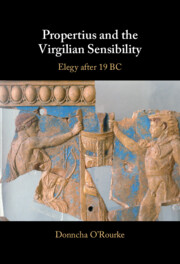Book contents
- Propertius and the Virgilian Sensibility
- Propertius and the Virgilian Sensibility
- Copyright page
- Dedication
- Contents
- Acknowledgements
- Abbreviations
- About the Texts and Translations Used in This Book
- Chapter 1 Introduction: Virgil and the Propertian Sensibility
- Chapter 2 Rus in Urbe
- Chapter 3 Shades of Dido
- Chapter 4 The Shield of Propertius
- Chapter 5 Romani patria Callimachi
- Chapter 6 Propertius’ Epic Designs
- Chapter 7 Conclusions
- Bibliography
- Index Locorum
- General Index
Chapter 7 - Conclusions
Propertius and the Virgilian Sensibility
Published online by Cambridge University Press: 28 November 2024
- Propertius and the Virgilian Sensibility
- Propertius and the Virgilian Sensibility
- Copyright page
- Dedication
- Contents
- Acknowledgements
- Abbreviations
- About the Texts and Translations Used in This Book
- Chapter 1 Introduction: Virgil and the Propertian Sensibility
- Chapter 2 Rus in Urbe
- Chapter 3 Shades of Dido
- Chapter 4 The Shield of Propertius
- Chapter 5 Romani patria Callimachi
- Chapter 6 Propertius’ Epic Designs
- Chapter 7 Conclusions
- Bibliography
- Index Locorum
- General Index
Summary
These concluding remarks offer a sideways look at some issues raised by this book, taking their cue from the surviving iconography of the monument at the centre of Propertius 4 – the Temple of Palatine Apollo – to address the ideological implications of the different handling by Propertius and Virgil of Augustan mythmaking. Ultimately the many traces of Virgilian sensibility in Propertius, and of Propertian sensibility in Virgil, are easier to identify than to interpret. Yet Propertius’ obsessive Virgilian intertextuality (here distilled into a multi-part typology), while showing that the elegist is haunted by his epic confrère, is also an exercise of control that transcends generic anxiety to recognize and enact Virgil’s status as a classic of the Roman literary canon. Propertius’ Virgilian intertextuality, extending as it does to structural and stichometric parallels, may also have implications for the textual criticism of both authors, at least insofar as a Virgilian reading of Book 4 obtains. These last reflections find their way to a comparison with Shostakowich’s Fourteenth Symphony, where uncanny thematic, political and structual parallels with Propertius 4 give pause for thought.
Keywords
- Type
- Chapter
- Information
- Propertius and the Virgilian SensibilityElegy after 19 BC, pp. 379 - 392Publisher: Cambridge University PressPrint publication year: 2024

